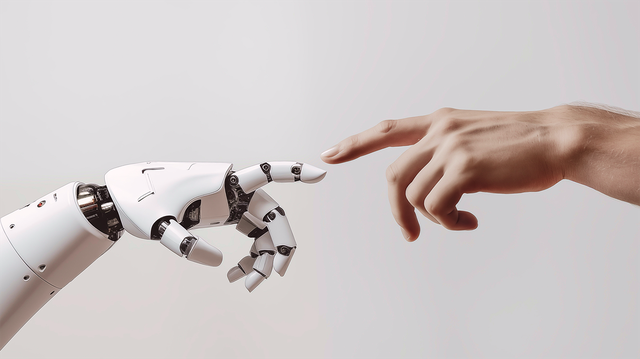The role of AI in the digital revolution

The technological revolutions of the past hinged upon mechanization, electrification, and digitization, and each stage spanned a shorter duration: mechanization over 100 years, electrification over 40 years, and digitization over about 20 years. This telescoping nature of technological innovation has shifted from changing over generations, to rapidly evolving within a lifetime.
And nowhere is this more evident than in the pace of changes in artificial intelligence. Machine excellence is no longer limited to simply executing predefined tasks. Now, AI is beginning to learn, adapt, and make decisions, driving a new, accelerated, technological revolution.
The roots of AI
The roots of AI can be traced back to the mid-20th century, when in 1956 the term Artificial Intelligence was first introduced during the Dartmouth Summer Research Project on Artificial Intelligence. This event marked the official recognition of AI as an academic discipline and set the stage for future research in the field. The earliest AI programs, such as the Logic Theorist from 1956, demonstrated that machines could carry out certain tasks that required human-like reasoning.
Over the following decades came significant advancements, including the development of neural networks in the 1980s, and the reinvention of deep learning techniques in the 2000s. The success of AlexNet in image recognition marked a breakthrough moment in 2012, which sparked the widespread use of deep learning techniques in various AI applications.
AI in various fields today
Today, artificial intelligence is integral to nearly every industry, influencing both innovation and operational efficiency. In the medical field, AI-powered algorithms support diagnosing diseases, tailoring treatment plans, and predicting patient outcomes. Some more advanced tools analyze medical imaging to identify critical health conditions such as cancer at their earliest stages, often surpassing human performance in accuracy and speed.
In finance, AI models are widely used to detect fraudulent activity, refine trading strategies, and manage risk. By analyzing vast datasets, machine learning algorithms uncover hidden patterns that signal potentially fraudulent transactions, enabling fast and accurate intervention from financial institutions. In manufacturing, artificial intelligence is transforming production lines by increasing efficiency and maintaining consistent quality control. Smart robotic systems adapt to changes in real time, minimizing downtime and boosting production reliability.
Meanwhile, in transportation, AI is powering autonomous vehicles and enhancing traffic management systems. Self-driving cars rely on artificial intelligence to interpret real-time sensor data, make decisions on navigation, and respond to dynamic road conditions. In the entertainment sector, AI is reinventing both content creation and consumption. Streaming services leverage AI to analyze viewer preferences and provide personalized recommendations, while generative AI models are being used to create original music, visual art, and even written narratives.
Discover AI-powered browsing
Aria, Opera’s AI, is free on both desktop and mobile. Generate images and text, and get up-to-date answers in over 50 languages without any account.


Ethical and societal impact
The widespread integration of artificial intelligence into nearly every aspect of modern life is raising many ethical and societal considerations. One of the key concerns is job displacement, as AI-powered automation can take over roles traditionally filled by human workers, particularly in manufacturing, logistics, and administrative tasks. However, new employment opportunities are emerging at the same time, in fields such as AI system development, data science, and robotics maintenance. This highlights the importance of workforce reskilling and education to keep pace with technological change.
Another concern is bias and fairness. AI systems, trained on large datasets that reflect existing social inequalities, can unintentionally mirror those biases in decision-making processes related to hiring, law enforcement, lending, and more. To ensure fairness, both transparent algorithm design and scrutiny of the data used to train these systems is required.
In addition AI’s ability to process enormous amounts of personal information brings serious privacy and security concerns that must be managed. Without proper safeguards, sensitive information is at risk of unauthorized access, leading to potential exploitation. Therefore, cybersecurity measures and ethical data management is essential.
Finally, regulation and governance play a critical role in shaping the responsible use of artificial intelligence. Governments and international organizations must work together to establish clear ethical frameworks that ensure AI is used safely, protecting human rights while encouraging innovation.
Future challenges with AI
Both transformative potential and deep uncertainty characterize the future of artificial intelligence across the industries. One of the most ambitious pursuits in AI research today is the development of Artificial General Intelligence (AGI) - machines that understand, learn, and reason across a wide variety of tasks at, or beyond, the level of human intelligence.
In contrast to current narrow AI systems, which are limited to specific domains, AGI could potentially revolutionize fields from science and education to governance and ethics. However, the pursuit of AGI remains a distant and uncertain goal and, for now, a work in progress.
Beyond AGI, artificial intelligence technology is increasingly influencing creative industries, with algorithms now capable of generating art, music, and written content - raising thought-provoking questions about the nature of creativity, authorship, and intellectual property. While some embrace AI as a helpful tool that enhances human creativity, others are not as adapted to it yet.


Meanwhile, the global development of AI remains uneven, with diverse regulatory frameworks. Countries like the United States, China, and members of the European Union are investing heavily in AI, each with a focus on different aspects around innovation, ethics, and control. This diverse approach presents an exciting opportunity for international cooperation to address shared struggles. By working as a global community, the potential of AI can be shared to reach everyone, creating positive outcomes for people everywhere.
Related articles
You deserve a better browser
Opera's free VPN, Ad Blocker, and Flow file sharing. Just a few of the must-have features built into Opera for faster, smoother and distraction-free browsing designed to improve your online experience.


Press Contacts!
Our press team loves working with journalists from around the world. If you’re a member of the media and would like to talk, please get in touch with us by sending an email to one of our team members or to [email protected]



